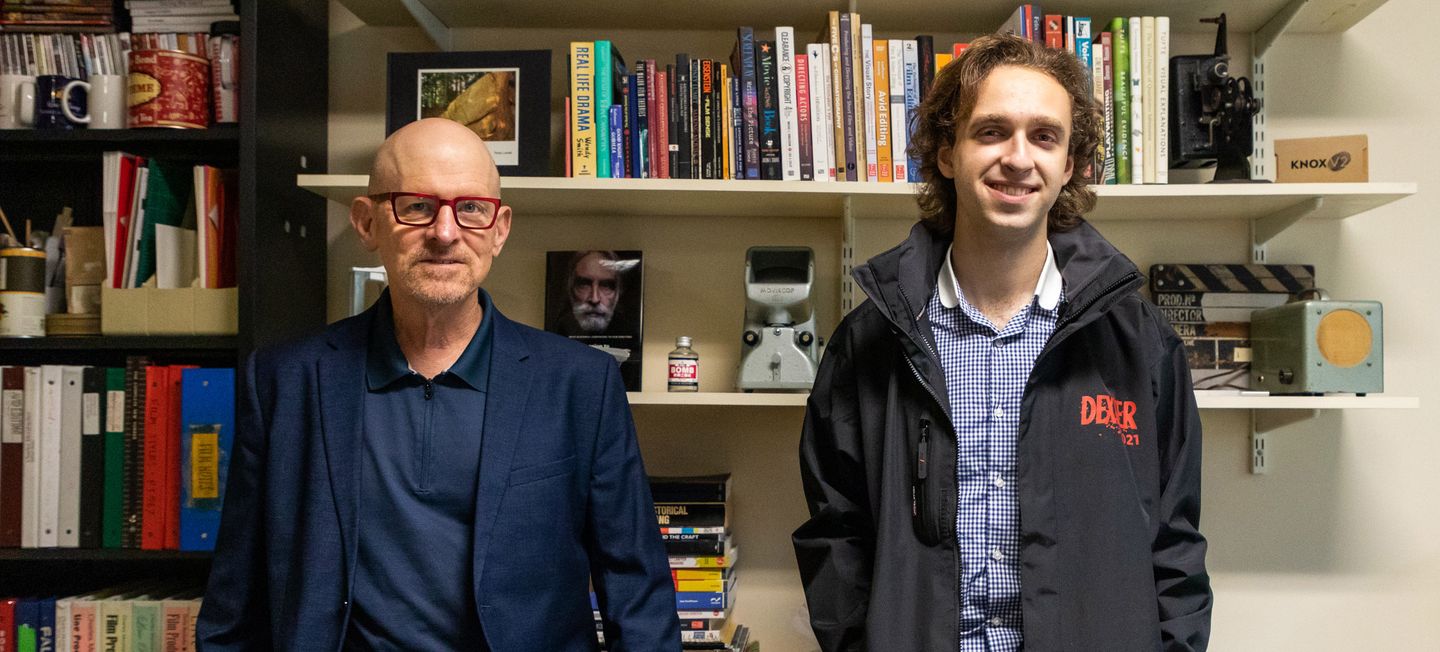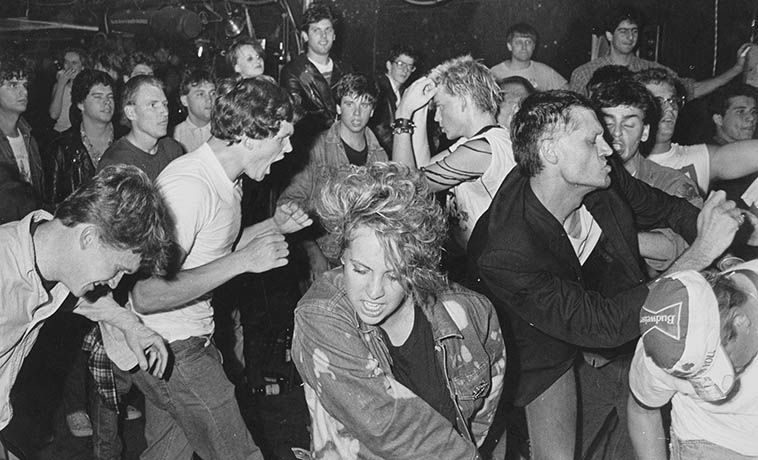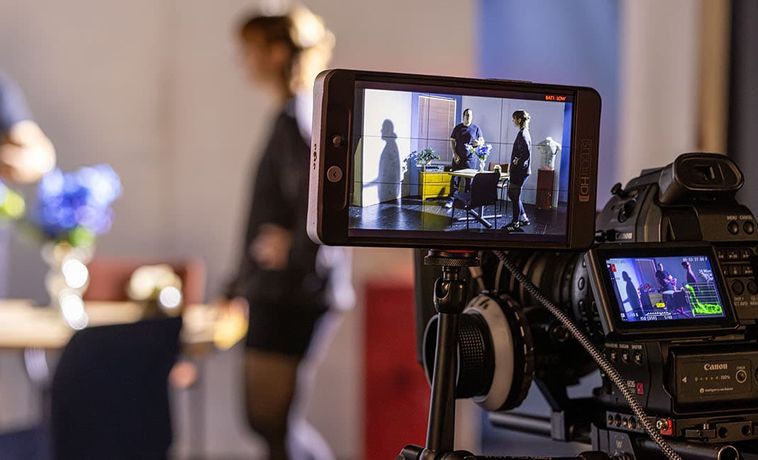A Mini-Hollywood in Massachusetts
How the Bay State built a thriving film industry—with a boost from COM

Charles Merzbacher, director of COM's film production programs, and Gerald Hinch. Photo by Guramar Lepiarz.
On a hot mid-July day this summer, Gerald Hinch was staying cool inside New England Studios, the sprawling film studio located on a former military base in central Massachusetts. As a production assistant on the forthcoming revival miniseries Dexter: New Blood—a continuation of Showtime’s popular show about fictional serial killer Dexter Morgan (Michael C. Hall)—part of Hinch’s job was to help keep the set quiet. On this particular day, that task was proving especially important. The show had recently wrapped up exterior filming in cities and towns around the state—from Boston to Worcester to idyllic Shelburne Falls—and had now moved into the studio. Hinch (’23) could sense a buzz of excitement from the crew members around him. The news was spreading: Massachusetts’ Governor Charlie Baker had just signed legislation to permanently extend the state’s film production tax credit. It was a huge milestone for the state’s growing film industry—and all but guaranteed future jobs at New England Studios.
“While I was working on Dexter, I realized that there are so many films and series that are being shot in Massachusetts or have recently been shot here, like the Black Panther sequel. And I quickly learned that has a lot to do with this tax credit,” says Hinch. “It was cool to witness everyone’s excitement.”
Over the last five years alone, Massachusetts has played host to productions including the recent Ryan Reynolds comedy Free Guy; the hit whodunnit Knives Out; the Greta Gerwig-directed Little Women; the Showtime series City on a Hill; and a slew of Netflix films including Spenser Confidential (which filmed scenes near BU’s West Campus) and the upcoming Jennifer Lawrence and Leonardo DiCaprio dark comedy Don’t Look Up. Since New England Studios opened in 2014—boasting four 18,000 square foot sound stages—it has supported television shows and films including the Hulu series Castle Rock and 2018’s blockbuster The Equalizer 2 starring Denzel Washington.
But 20 years ago, it seemed impossible that so many major productions would choose to film in the state, says Charles Merzbacher, an associate professor of film and the director of COM’s film production programs. “There was effectively a boycott on producing anything in Massachusetts,” he says. First, there was no real economic incentive to film in the state. Then, there was the lack of a sophisticated infrastructure to support productions coming to the state with tasks such as securing permits. There were also long-standing issues—including allegations of intimidation—with a labor union representing workers employed on productions.
The number of projects coming to the state dwindled and something had to give.
A Changing Landscape
In 2005, Merzbacher joined a meeting of stakeholders in the state’s film and media production field. Actors, camera rental company owners, producers, labor union representatives and others had gathered at a theater in Harvard Square to brainstorm ways to promote and protect the industry.
“It seemed like everybody in the media community in Massachusetts was there,” says Merzbacher. “For me personally, that was very important. I had been teaching in Boston for about 10 years, but I didn’t really feel very connected to the community because there wasn’t a place where you could just go and meet people. But then suddenly here it was.”
That meeting spurred the creation of the Massachusetts Production Coalition (MPC), a group devoted to advocating for the film and media industry in the state. The top item on MPC’s agenda at the time: make Massachusetts more economically attractive to productions. The group lobbied the state to implement a motion picture tax credit that would make Massachusetts competitive with other states that already boasted such benefits. Their wish was granted in 2006, when the state enacted a 20 percent tax credit for production payroll expenses and a 25 percent credit for production expenses. The payroll credit has since increased to 25 percent.
“A lot of us were really surprised that we actually succeeded, and so quickly,” says Merzbacher, who today is the vice president of the MPC. “And being a natural pessimist, I thought that it would have an impact, but it would be sort of a transient thing.” Because there had been a dearth of productions, there wasn’t a strong local crew base to support a thriving film industry. “That was one of the reasons why I was a skeptic. I thought, well, they’ll spend money here, but they won’t actually transform the local media landscape because they’re just going to bring in all their own crew. I’ve never been more wrong about anything.”
The tax benefit soon brought a number of genre-spanning productions to the state including the goofy comedy Paul Blart: Mall Cop, the thriller Shutter Island and the romantic comedy The Proposal. According to Merzbacher, the Massachusetts Film Office also expanded its infrastructure to better accommodate productions and help them with financial and labor-related logistics. Timothy Grafft (‘85), who recently retired from his position as the office’s deputy director, played a big role in promoting the state as a filming location. As the number of productions coming to Massachusetts increased, the local crew base began to develop and more brick-and-mortar companies opened to provide services like editing and studio space.
“The tax credit really did transform the local media production environment,” says Merzbacher. But until Governor Baker signed the incentive program’s permanent extension in July, there had been an ongoing battle to maintain it. At one point in 2015, Baker proposed getting rid of it entirely in order to expand a tax credit for low-income workers.
“There was a sunset clause [on the tax credit] and so our fight began,” says Don Packer (DGE’75, COM’77), a founding member of the MPC and president of the organization from 2012 to 2013. “Over the years, we worked diligently to gather industry professionals from all walks, and even those tangentially affected by our industry, to support this.”
The rise in popularity of streaming services has also highlighted the importance of making the credit permanent as so many more multiseason series are being produced. “A streaming service is not going to commit to production in a place where they worry that in a year it’s going to cost them 30 percent more,” says Merzbacher. “Now they can have peace of mind.”
It‘s also given the MPC peace of mind. “It’s been a real relief for us. We’re about more than just ‘let’s get a tax credit.’ We’re about workshops and networking and supporting media professionals in Massachusetts,” says Merzbacher. “Now we can fully devote our time towards developing these things since we don’t have to spend so much time trying to convince people to preserve the tax credit.”
The Future of Film
Dexter: New Blood is one of more than a dozen productions—including another installment of American Horror Story and Julia, a forthcoming HBO Max series based on Julia Child’s life—that were filmed in Massachusetts in 2021. “It’s really exciting to see how the film industry is taking off in Massachusetts,” says Hinch. “The whole experience [with Dexter] was eye opening, being able to be so close to the set and the actors and be exposed to how the industry works.”
As the number of productions filming in Massachusetts continue to grow, Merzbacher hopes that strides are made in further developing the local workforce to match the momentum, and that more people, like Hinch, can see a film career in the state as a viable option. He envisions that some of the MPC’s future programming will help with this effort.
“When I was in high school, I didn’t have a clue how to become a filmmaker,” Merzbacher says. “I hope that we’ve made the path clearer and that any high schooler in this state in five or 10 years will be able to say, ‘Oh, there are a lot of films being made in here, and if I want to pursue it, that’s a career I could have.’ Because people like Gerald are the future of the industry here. And I really want them to stay and make movies in Massachusetts.”



